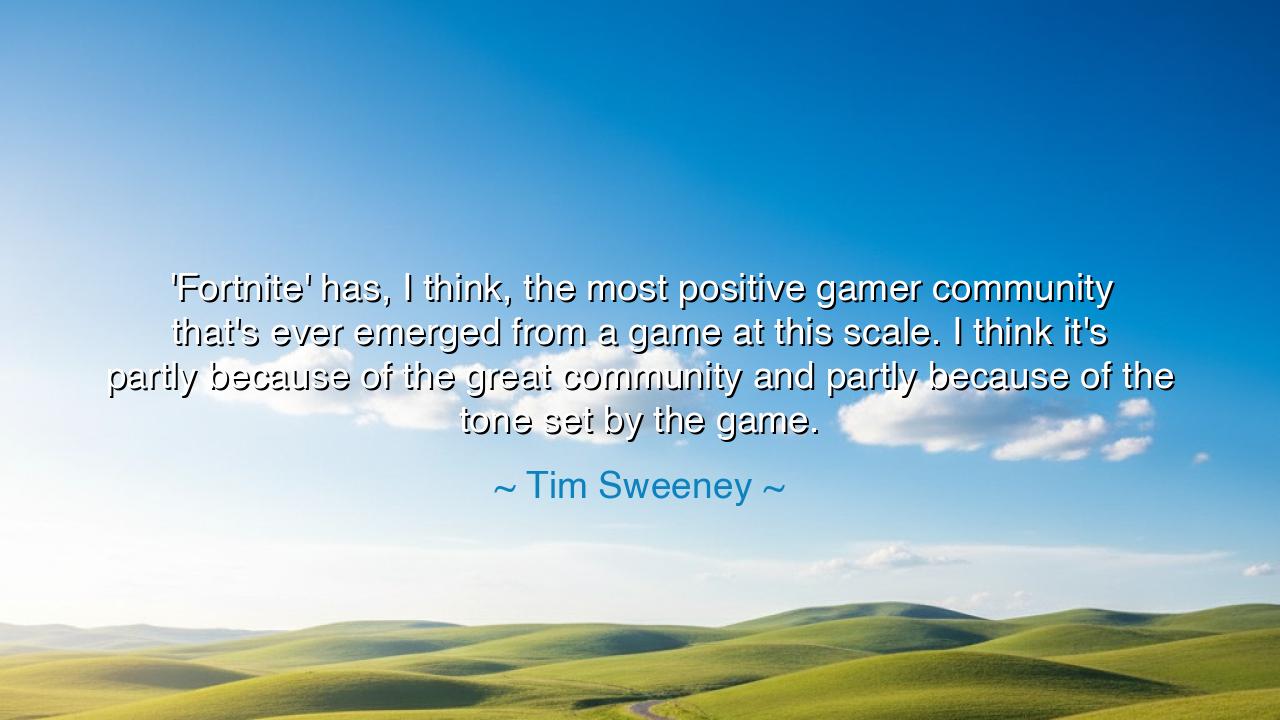
'Fortnite' has, I think, the most positive gamer community
'Fortnite' has, I think, the most positive gamer community that's ever emerged from a game at this scale. I think it's partly because of the great community and partly because of the tone set by the game.






The words of Tim Sweeney, “‘Fortnite’ has, I think, the most positive gamer community that’s ever emerged from a game at this scale. I think it’s partly because of the great community and partly because of the tone set by the game,” rise as both praise and revelation. He does not speak merely of a pastime, but of a gathering of souls across the world, joined not by borders or blood, but by shared joy in play. His words remind us that even in the age of machines and screens, humanity’s oldest truth holds: when people come together in the spirit of play, they forge bonds as real as those made on the battlefield or the marketplace.
The origin of his insight lies in the phenomenon of Fortnite, a game that rose not only as entertainment but as a cultural force that united millions. At its heart was not darkness or destruction, but creativity, humor, and competition balanced by camaraderie. Unlike other games whose tone was grim or harsh, Fortnite invited players into a world of color, absurdity, and delight. The field of battle was softened by dance, costumes, and laughter, and so the community reflected the same spirit: light where there could have been shadow, fellowship where there could have been scorn.
History, too, offers parallels. Consider the Olympic Games of ancient Greece. Though born from rivalry between city-states often drenched in war, the Olympics created a sacred pause, a community of athletes and citizens who, for a time, laid down their arms to celebrate strength, skill, and unity. The tone of the games transformed enemies into competitors, and competitors into fellow celebrants. Just as Fortnite’s playful dances temper the sting of defeat, the sacred flame of Olympia tempered hatred into harmony.
Sweeney’s words also contain a deeper warning: the tone set by any gathering—whether a game, a nation, or a family—becomes the soil in which its people grow. When leaders sow hostility, the people harvest division. When they sow joy and creativity, they reap positive fellowship. The strength of Fortnite’s community is not an accident, but the fruit of intention: a reminder that culture shapes conduct, and conduct shapes destiny.
For gamers, for builders of communities, and for leaders of all kinds, the lesson is the same: what you create will mirror the spirit in which it was made. If the rules of the game, the tone of the gathering, or the atmosphere of the workplace exalt cruelty, cruelty will multiply. But if they exalt laughter, inclusivity, and respect, the community will answer in kind.
Practical actions emerge clearly from this wisdom. When building your own communities, whether in life, in work, or online, ask yourself: What tone am I setting? What behaviors am I encouraging? Celebrate kindness as fiercely as you celebrate success. Offer spaces where creativity can flourish, where diversity is honored, and where defeat does not mean shame but a chance to try again.
The lesson for future generations is timeless: greatness lies not only in scale, but in spirit. A community of millions can be toxic and cruel, or it can be uplifting and positive. The difference lies in the foundation it is built upon. As Sweeney shows through Fortnite’s story, joy and play can guide a vast multitude into harmony.
Let all remember: the games we create, the words we speak, the tone we set—these are seeds cast into the world. Plant bitterness, and the harvest will be bitter. Plant laughter, respect, and hope, and the harvest will be a community that lifts each soul higher. This is the eternal truth of human gatherings, whether in ancient arenas or digital worlds: the spirit you set becomes the spirit you keep.






VDDoan Van Duc
I’m curious about what Tim Sweeney means by the tone set by 'Fortnite'. Does that tone influence how players interact with one another in the game? How important is it for developers to actively cultivate a positive atmosphere, especially in competitive online games where the environment can often be hostile? Can other games follow 'Fortnite's' example, or is it more of a rare occurrence?
MTminh thu nguyen thi minh thu
It’s refreshing to hear such positive feedback about 'Fortnite' and its community. But can a game truly have a positive impact on its community, or does it depend more on the individuals who play it? How much credit should the developers take for fostering a positive space, and how much is a reflection of the players’ behavior and interactions?
NH20 06 07 Nho Hoang
Tim Sweeney’s point about 'Fortnite' having the most positive gamer community is surprising, considering how toxic some online gaming communities can be. But what makes 'Fortnite' different? Could it be the game’s accessibility and casual nature? Do you think the community vibe comes more from the developers’ intention, or is it shaped by the players themselves over time?
NHDao Nay H
It’s really interesting to hear Tim Sweeney praise 'Fortnite' for its positive community. It makes me wonder—what exactly sets 'Fortnite' apart from other games in fostering such a healthy environment? Is it the in-game tone, or the way the community has been shaped by the developers' approach? Could other games replicate this positive atmosphere, or is it unique to 'Fortnite'?